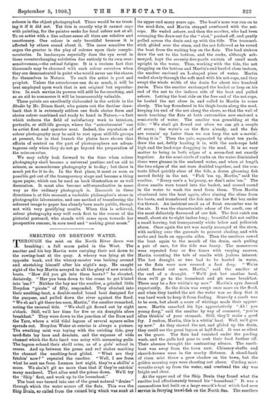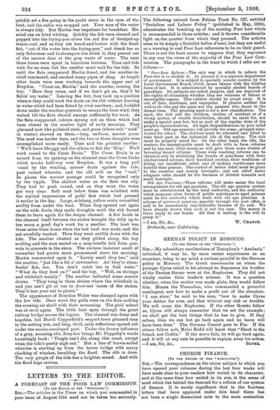SMELTING ON BREYDON WATER.
THROUGH the mist on the North River dawn was breaking : a full moon paled in the West. The smelter and his boy Martin were carrying their net down to the rowing.boat at the quay. A wherry was lying at the opposite bank, and the wherry-master was looking around and stretching himself after his night's nap. He caught sight of the boy Martin arrayed in all the glory of new crotch- boots. " How did you git into them boots ? " be shouted, derisively. "Her you been down to the crane to get h'isted into 'em P " Neither the boy nor the smelter, a grizzled little Breydon "pirate" of fifty, responded. They climbed into their smelting-boat, a double-ended broad boat designed for the purpose, and pulled down the river against the flood. " We sh an't git there too soon, Martin," the smelter remarked, noting the unusual tide. " We shall git flowed out by eight o'clock. Still, we'll her time for five or six draughts afore breakfast." They were down to the junction of the Burro and the Tare, where a wild tidal lagoon of several square miles spreads out. Breydon Water at sunrise is always a picture. The swathing mist was toying with the swirling tide, grey rend-fiats lay bare and desolate, and the expanse of wide channel which the flats lined was noisy with screaming gulls. The lagoon echoed their shrill cries, as of a girls' school in recess. And up between the green and red stakes marking the channel the smelting-boat glided. " What are they fetehin' now P " repeated the smelter. " Well, I see from
whet he sent me from Lannon last night, they're a a score. We cha'n't git no more than that if they're catchin' many mackerel. That allus send the prices down. We'll try the 'Ship' first, and work up to the houseboat."
The boat was turned into one of the great natural "drains" through which the water scours off the flats. This was the ship Drain, so called from the ruined brig which WWI sunk at
its upper end many years ago. The boat's nose was run on to the mud-flats, and Martin stepped overboard with the net- rope. He waded ashore, and then the smelter, who had been arranging the draw-net for the " shot," pushed off, and gently pulled across the drain and up with the tide. The trammel. stick glided over the stern, and the net followed as he rowed the boat from the waiting boy on the flats. The lead sinkers drew the net to the bottom, and the corks, although sub- merged, kept the seventy-five-yards curtain of small mesh upright in the water. Thus, working with the tide, the net dragging on the bottom and Martin's end hauled close inshore, the smelter enclosed an L-shaped piece of water. Martin waded slowly through the soft mud with his net-rope, and they swept the whole width of the drain for about two hundred yards. Then the smelter exchanged the becket or loop on his end of the net to the inshore side of the boat and pulled ashore. Letting the boat ride on the free end of the net-rope, he hauled the net close in, and called to Martin to come slowly. The boy floundered in his thigh-boots along the mud, keeping his end of the net along the shore, so that the wall of mesh touching the flats at both extremities now enclosed a semi-circle of water. The smelter was grumbling at the tide: " We shall git flowed out afore we can git a couple of score ; the water's on the flats a'ready, and the fish are runnin' up faster than we can keep the net a-movin'. Bring it in." Then the pair, separated by about ten yards, drew the net, deftly hauling it in, with the cork-rope held high and the lead-rope dragging in the mud. It is no easy matter to bring in both edges of a seven-foot net exactly together. As the semi-circle of corks on the water diminished there were gleams in the enclosed water, and when at length the two edges of the net were doubled together, and the con- tents lifted quickly clear of the tide, a dozen gleaming fish moved feebly in the net. " Pick 'em up, Martin," said the smelter. "Every one's a ha'penny, so don't miss 'em." The dozen smelts were tossed into the basket, and soused round in the water to wash the mud from them. Then Martin clambered into the boat again, after rinsing the slime from his boots, and transferred the fish into the low flat box under the thwart. An insistent smell as of fresh encumber was in the air. It was the characteristic odour of the smelt, one of the most delicately flavoured of our fish. The first catch ran small, about six to eight inches long ; beautiful fish not unlike a small herring, but transparently white below and yellowish above. Once again the net was neatly arranged at the stern, with sacking over the gunwale to prevent chafing, and with corks and leads on opposite sides. Then the smelters rowed the boat again to the mouth of the drain, each pulling a pair of oars, for the tide was heavy. The manoeuvres were repeated four or five times with varying success, Martin counting the tale of smelts with jealous interest. The last draught or two had to be hauled in water, as the flats were now covered a foot deep. " We're about flowed out now, Martin," said the smelter at the end of a draught. " We'll jest hey another haul, then we'll go to the houseboat and git some breakfast. There may be a few whitin's up now." Martin's eyes danced expectantly. So the drain was swept once more on the flood, and when they hauled the net the water was so deep that it was hard work to keep it from fouling. Scarcely a smelt was to be seen, but about a score of whitings made their appear- ance. Martin smacked his lips appreciatively " I you young dorg," said the smelter by way of comment, "you're allus thinkin' of your stomach. Still, they'll make a good fly. I reckon, Martin, this is a whitin' haul. Well, we'll give up now." As they stowed the net, and glided up the drain, they could see the great lagoon at half-flood. It was as silent as the grave. The flats had vanished under the purling wash, and the gulls had gone to seek their food further off. Their absence brought the contrasting silence. The smelt- boat was away from the town now. Chimney-shafts and church-towers were in the murky distance. A cloud-bank of risen mist threw a grew shadow on the town, but the golden morning rays were shooting out above. Curling mist- wreaths crept up from the water, and overhead the sky was bright and clear.
At the upper end of the Ship Drain they found what the smelter bad affectionately termed his "houseboat." It was a commodious but built on a large smack's-boat which had seen service in-ferrying trawl•flsh on the North Bea. The smelters
quickly set a fire going in the yacht stove in the eyes of the boat, and the. cabin was mopped out. Your man of the water is always tidy. But Martin was impatient for brealtfast. His mind ran on fried whiting. Quickly the fish were cleaned and popped into the frying-pan above the red fire of dredged-up steam-coal, and as they ate bread-and-butter with the fresh fish, "out of the water into the frying-pan," and drank tea as only fishermen and bushrangers can drink it, they peered out of the narrow door at the grey waste of water. The next three hours were spent in luxurious laziness. Time and tide wait for no man, but the smelter must wait for the tide. So until the flats reappeared Martin dozed, and the smelter-in- chief ruminated, and smoked many pipes of shag. At length other boats were seen working towards the upper end of Breydon. " Come on, Martin," said the smelter, rousing the boy. " Here they come, and if we don't git on, they'll be fishin' our water." Leaving the hut, they took up a position whence they could work the drain on the ebb without drawing in water which bad been fished by rival smelters; and, huddled down under the weather-gunwale to escape the keen wind, they waited till the flats should emerge sufficiently for work. As the fiats reappeared, colours sprang out on them which had been absent in the sombre light of early morning. They gleamed now like polished steel, and grass (where eels " mud" in winter) showed on them,—long, uniform, marine grass. The mud was harder here, and the two or three draughts were accomplished more easily. Then said the grizzled smelter : " We'll leave Shuggy and the others to fish the Ship.' We'll work round to the Cross Drain." The Cross Drain is so named from its opening on the channel near the Cross Stake which marks half-way over Breydon. It was a long pull round by the winding, narrow drain against the tide, past ruined wherries and the old mill on the " wall." In places the narrow passage could be recognised only by the ripple. The shallow water on the flats was oily. They had to push round, and as they went the water got very clear. Soft mud below them was wrinkled with the myriad impressions of gulls' feet which had pressed it earlier in the day. Large, sidelong, yellow crabs scrambled swiftly from under the boat. When they opened out again on the wide drain, they made draughts until the ebb forced them to leave again for the deeper channel. A few hauls in the channel itself between the stakes brought the tally up to ten score, a good day's work for a smelter. The boat was three miles from home when the last haul was made, and the net carefully washed. Then they went swiftly down with the tide. The smelter chatted as they glided along, the boy
sculling and the man seated on a mop-handle laid from gun- wale to gunwale in the stern. The curious insistent smell of cucumber had grown more pronounced since the morning. Martin commented upon it. " Lovely smell they hey," said the smelter, "jest like a bit o' cowcumber. An' they're clean- feedin' fish, too. You don't catch 'em in foul water."
"What do they feed on P" said the boy. " Well, on shrimps and whitebait mainly." The smelter indicated some narrow drains. "They hang in them sluices where the whitebait is, and you can't git at 'em to draw-net 'cause of the stakes. They'd tear your net to pieces."
The appearance of Breydon Water was changed again with the low tide. Once more the gulls were on the flats making the evening air shrill with their screaming. The girls' school was at revel again. The little boat spun through the great railway bridge across the lagoon. The channel was drear and hopeless, but David Copperfield's seaport town gleamed rosy
in the setting sun, and long, vivid, calm reflections spread out under the smoke-enveloped port. Under the dreary influence,
of a grey, moaning ebb, Breydon brings Mr. Peggotty's words hauntingly back : "People can't die, along this coast, except when the tide's pretty nigh out." But a line of brown-sailed wherries is starting up from the haven bridge with merry Clanking of winches, heralding the flood. The ebb is done. The very gurgle of the tide has a brighter sound. And with the flood hope revives.







































 Previous page
Previous page